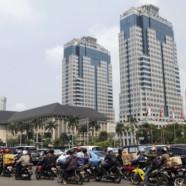Indonesia Revives Population-Control Measures to Slow Growth
Indonesian President Susilo Bambang Yudhoyono wants families to stop at two children to prevent a burgeoning population from overwhelming schools and services. Asih, a cleaner in Tangerang, near Jakarta, is stopping at seven.
“In my family, we always had a lot of children, and as long as we still had something to eat, why do family planning?” said Asih, 35. “Now I have two children in primary school and more that will have to go in the next few years, and I have no money to pay school fees.”
Facing slower investment and one of the highest youth unemployment rates in the Asia-Pacific region, the government is concerned the demographic dividend that attracts companies seeking a young, cheap workforce will become an economic time bomb. As Indonesia’s growth slows, the world’s fourth-most-populous nation isn’t generating enough quality jobs to keep up with the population, the International Labour Organization said.
That prospect has brought the revival of a birth-control program begun 46 years ago by former President Suharto — who managed to halve the fertility rate to about 2.6, where it’s been stuck ever since. The government wants to cut the rate to the replacement level of 2.1 within two years to prevent the population of 250 million from doubling by 2060.
“We have to go back to the policies of the Suharto era, to make strong campaigns and bring the fertility rate down,” said M. Sairi Hasbullah, head of Indonesia’s statistics bureau for East Java province. “It’s not going to be easy to provide food, education, health facilities and infrastructure for 500 million people.”
The government has increased the budget for family-planning programs by almost 400 percent since 2006, funding everything from training rural midwives via text messages to persuading Muslim clerics to encourage vasectomies. The measures extend efforts dating back to 1968, when Suharto set up the National Family Planning Institute to provide advice and contraceptives.
While Southeast Asia’s largest economy is trying to slow population growth, other countries in the region are trying to increase it. Singapore offers cash handouts and extended maternity leave to encourage its citizens to have more kids, while China has loosened its one-child policy that has saddled the nation with an aging labor force.
“Indonesia is seen by other countries as an opportunity because of its population,” said Aris Ananta, a senior research fellow at the Institute of Southeast Asian Studies in Singapore. “ The government is shifting its responsibilities if it’s blaming population growth for a failure to provide enough infrastructure or jobs.”
About 19.6 percent of Indonesian youths between the ages of 15 and 24 were jobless in 2012. Unemployment, inflation and the so-called youth bulge, a phenomenon where a large share of the population comprises children and young adults, contributed to the Arab Spring protests that ousted leaders in Tunisia, Libya and Egypt in 2011.

